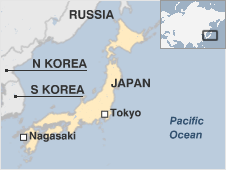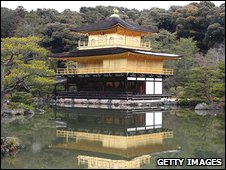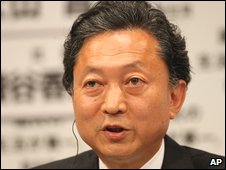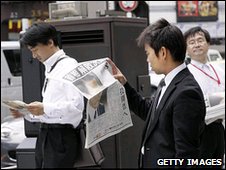 |
Japan has the world's second-biggest economy achieving an economic miracle in the second half of the 20th Century that was the envy of the
rest of the world.
Its role in the international community is considerable. It is a major aid donor and a source of global capital and credit.
For the majority life in Japan is urban. More than three quarters of the population live in sprawling cities on the coastal fringes of Japan's four mountainous wooded islands.
Overview
Japan's rapid post-war expansion - propelled by highly successful car and consumer electronics industries - ran out of steam by the 1990s.
AT-A-GLANCE
 Politics: The Liberal Democratic Party (LDP) was in power for much of the country's post-war history
Economy: Japan has the world's second-largest economy; its multinationals are household names
International: There has been tension with China and South Korea over Japan's wartime past; Japanese troops have served in Iraq and the country seeks a greater peacekeeping role
|
The 1997 Asian financial crisis and bouts of recession precipitated major banking public spending and private sector reforms.
Japan remains a traditional society with strong social and employment hierarchies - Japanese men have tended to work for the same employer throughout their working lives.
But this and other traditions are under pressure as a young generation more in tune with Western culture and ideas grows up.
Japan's relations with its neighbours are still heavily influenced by the legacy of Japanese actions before and during World War II. Japan has found it difficult to accept and atone for its treatment of the citizens of countries it occupied.
A Japanese court caused outrage by overturning a compensation order for Korean women forced to work as sex slaves.
South Korea and China have also protested that Japanese school history books gloss over atrocities committed by the Japanese military. Japan has said China promotes an anti-Japanese view of history.
Following World War II lawmakers forged a pacifist constitution.
But the deployment of Japanese troops in Iraq following the US-led invasion in 2003 divided public opinion and sparked claims that the move was unconstitutional.
Twenty percent of the world's earthquakes take place in Japan which sits on the boundaries of at least three tectonic plates. The government has set targets for reducing the number of deaths and the economic damage after any future powerful quake.
Facts
- Full name: Japan
- Population: 127.2 million (UN 2009)
- Capital: Tokyo
- Area: 377864 sq km (145894 sq miles)
- Major language: Japanese
- Major religions: Shintoism Buddhism
- Life expectancy: 79 years (men) 86 years (women) (UN)
- Monetary unit: yen
- Main exports: Vehicles computer parts chemicals scientific instruments and watches
- GNI per capita: US $38210 (World Bank 2008)
- Internet domain: .jp
- International dialling code: +81
Leaders
Head of state: Emperor Akihito
Akihito succeeded his father Hirohito in 1989. Under the 1947 constitution Japan's emperors have a purely ceremonial role.
Prime minister: Yukio Hatoyama
Yukio Hatoyama and his centre-left Democratic Party of Japan won a landslide victory in a snap general election in August 2009 sweeping away more than 50 years of nearly unbroken rule by the conservative Liberal Democratic Party.

Yukio Hatoyama swept to power on a wave of anger against the LDP
|
The vote called by LDP PM Taro Aso following a string of stinging local election defeats was the culmination of years of gradually rising voter dissatisfaction with the LDP's long reign exacerbated by a severe economic crisis.
Despite winning 308 out of 480 seats in the lower house the DPJ formed a coalition with two smaller parties - the Social Democratic Party and the People's New Party - to give it a majority in the powerful upper house.
Apart from a two-year period in the 1990s the LDP had been in power continuously since its founding in 1954.
Mr Hatoyama promised "revolutionary change" that would curtail the power of the bureaucracy and put the quality of life of ordinary Japanese ahead of big business interests. He also criticised US "market fundamentalism" and called for a more caring and humane society.
Other pledges included free high-school education a higher minimum wage petrol tax cuts and a promise not to raise sales taxes prompting critics to ask how the DPJ will pay for its policies.
Despite his talk of revolution Mr Hatoyama is the offspring of one of Japan's most prominent political dynasties and was once himself an LDP member.
His grandfather Ichiro Hatoyama was prime minister from 1954-56 and one of the LDP's co-founders while his father was an LDP foreign minister in the 1970s. Another grandfather founded the Bridgestone tyre-making company.
Born in 1947 Yukio Hatoyama studied at the prestigious Tokyo University and gained a PhD from Stanford University in the US before being elected an LDP member of parliament in 1986.
After quitting the party in 1993 over a series of corruption scandals in its leadership he went on to join other LDP defectors to co-found the DPJ. He became the party's leader for a second time in May 2009 after his predecessor Ichiro Ozawa resigned amid a funding scandal.
Mr Hatoyama nicknamed "Alien" by colleagues for his appearance is married to a former actress Miyuki. The couple have one son.
Media
Japan's broadcasting scene is advanced and vibrant with established public and commercial outlets competing for audiences.

Some 80% of Japanese read newspapers every day
|
There are five national terrestrial TV companies including the public broadcaster NHK which also runs national radio networks. Most of NHK's funding comes from the licence fees paid by viewers.
Japanese broadcasting is diversifying rapidly. Many millions of viewers now watch satellite and cable pay-TV services including those provided by NHK.
The country has spearheaded high-definition TV (HDTV) and an NHK channel is dedicated to such transmissions. Digital terrestrial TV broadcasting is being rolled out.
News drama variety shows and sport - especially baseball - all garner large audiences. Imported TV programmes are not staple fare on Japan's main TV networks but Western influences are often apparent in home-made programmes.
Japan was years ahead of the US and Europe in pioneering reality TV in which ordinary people are placed in extraordinary situations.
Newspaper readership is very high with some 80% of Japanese reading a paper every day. National dailies sell in their millions boosted by afternoon and evening editions. However circulation and advertising revenue are declining amid competition from the internet and other media.
The press
- Asahi Shimbun - daily English-language pages
- Yomiuri Shimbun - daily English-language pages
- Mainichi Daily News - English-language pages
- Sankei Shimbun - daily
- Nikkei Net - English-language pages
- The Japan Times - English-language
Television
- NHK - public operates the General TV Educational TV channels. NHK also runs satellite channels BS-1 and BS-2 and high-definition TV (HDTV) network Digital Hi-Vision. NHK World is the organisation's international English-language channel.
- TV Asahi - national commercial network
- Fuji TV - national commercial network
- Nippon TV (NTV) - national commercial network
- Tokyo Broadcasting System (TBS) - national commercial network
Radio
- NHK - public operates news/speech-based Radio 1 cultural/educational network Radio 2 classical music-based network FM Radio external service Radio Japan
- Inter FM - Tokyo commercial music station
- J-Wave - Tokyo commercial music station
- Tokyo FM - Tokyo-based commercial network
- TBS Radio - network operated by Tokyo Broadcasting System
News agency
-
Kyodo - English-language pages
AFRICA | ASIA-PACIFIC | AMERICAS | EUROPE | MIDDLEEAST | SOUTHASIA
Mauritania Mauritius Morocco Mozambique Namibia Niger Nigeria Republic-of-congo Rwanda Sao-tome-and-principe Senegal Seychelles Sierra-leone Somalia South-africa Sudan Swaziland Tanzania The-gambia Togo Tunisia Uganda zambia Zimbabwe Australia Brunei Burma Cambodia China East-timor Fiji Indonesia Japan Kazakhstan Kiribati Kyrgyzstan Laos Malaysia Marshall-islands Micronesia Mongolia Nauru New-zealand North-korea Palau Papua-new-guinea Samoa Singapore Solomon-islands South-korea Taiwan Tajikistan Thailand The-philippines Tonga Turkmenistan Tuvalu Uzbekistan Vanuatu Vietnam Antigua-and-barbuda Argentina Bahamas Barbados Belize Bolivia Brazil Canada Chile Colombia Costa-rica Cuba Dominica Dominican-republic Ecuador El-salvador Grenada Guatemala GuyanaHaiti Honduras Jamaica Mexico Nicaragua Panama Paraguay Peru St-kitts-and-nevis St-lucia St-vincent-and-the-grenadines Suriname Trinidad-and-tobago United-states-of-america Uruguay Venezuela Albania Andorra Armenia Austria Azerbaijan Belarus Belgium Bosnia-hercegovina Bulgaria Croatia Cyprus Czech-republic Denmark Estonia Finland France Georgia Germany Greece Hungary Iceland Ireland Italy Latvia Liechtenstein Lithuania Luxembourg Macedonia Malta Moldova Monaco Montenegro Norway Poland Portugal Russia San-marino Serbia Slovakia Slovenia Spain Sweden Switzerland The-netherlands Turkey Ukraine United-kingdom Vatican Algeria Egypt Iran Iraq Israel-and-palestinian-territories Jordan Kuwait Lebanon Libya Mauritania Oman Saudi-arabia Sudan Syria Tunisia United-arab-emirates Yemen Afghanistan Bangladesh Bhutan India Nepal Pakistan Sri-Lanka The-Maldives

